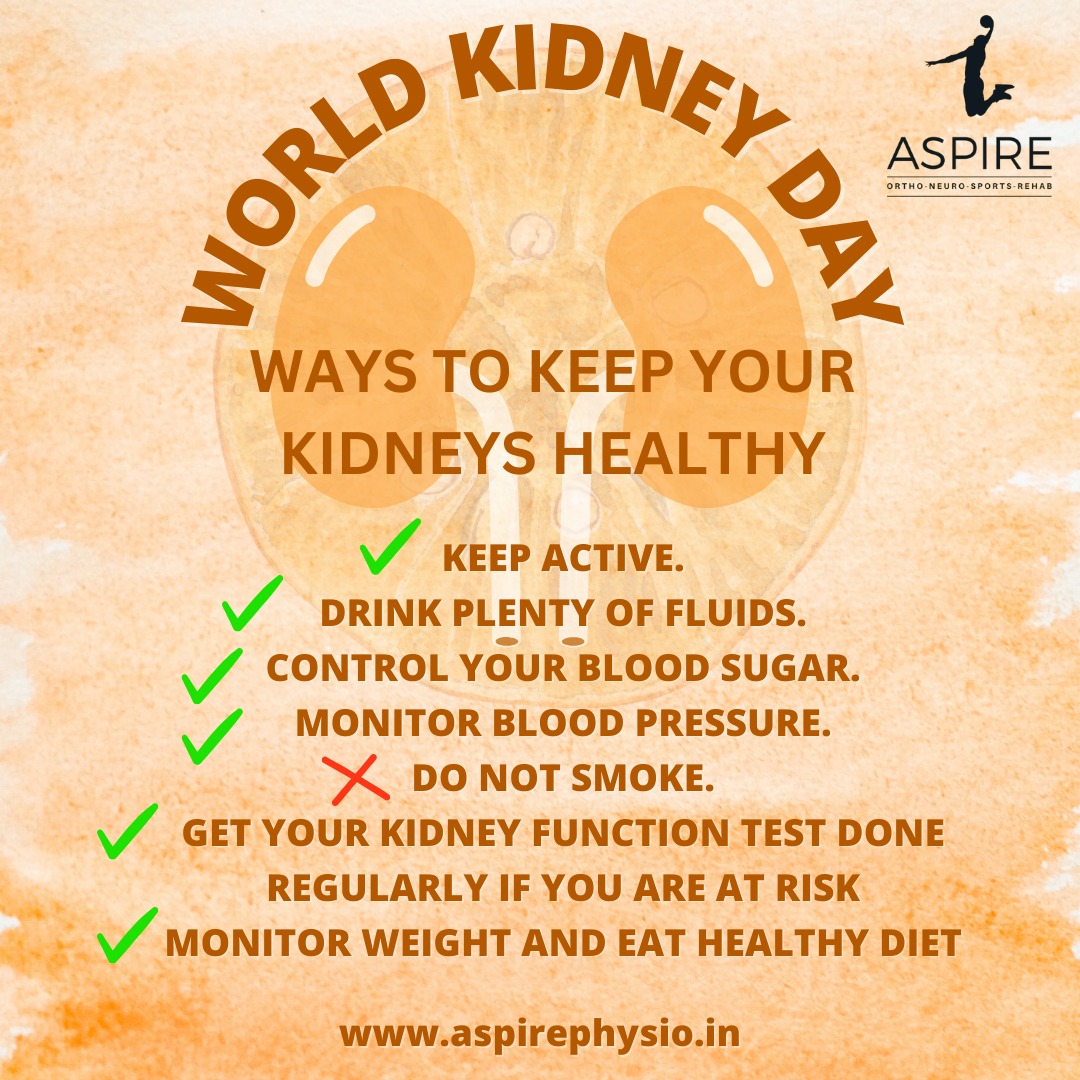
Kidney Health Matters: The Role of Physical Rehabilitation on World Kidney Day
- Home
- Kidney Health Matters: The Role of Physical Rehabilitation on World Kidney Day

World Kidney Day is a global campaign aimed at raising awareness about the importance of kidney
health and reducing the burden of kidney disease worldwide. This annual event serves as a platform to
educate individuals about preventive measures, early detection, and treatment options for kidney-
related conditions.
Among the various approaches to promoting kidney health, physical rehabilitation
plays a crucial role in improving outcomes for individuals with kidney disease. In this blog, we will
explore the significance of physical rehabilitation in managing kidney health and its impact on World
Kidney Day.
Understanding Kidney Health
The kidneys are vital organs responsible for filtering waste products and excess fluids from the blood,
regulating blood pressure, and producing hormones that control various bodily functions. However,
various factors such as diabetes, hypertension, obesity, and genetic predisposition can lead to kidney
damage and dysfunction.
Chronic kidney disease (CKD) is a prevalent condition characterized by
gradual loss of kidney function over time, often progressing to end-stage renal disease (ESRD)
requiring dialysis or kidney transplantation for survival.
Role of Physical Rehabilitation
Physical rehabilitation encompasses a range of interventions designed to optimize physical function,
alleviate symptoms, and improve overall well-being. While traditionally associated with
musculoskeletal injuries or neurological conditions, physical rehabilitation has emerged as a valuable
adjunct therapy in managing kidney disease. Here are some ways in which physical rehabilitation can
benefit individuals with kidney-related conditions:
1. Exercise Therapy:
Regular exercise is essential for maintaining cardiovascular health, managing blood pressure,
and controlling weight – factors crucial for preventing and managing kidney disease. Exercise
therapy tailored to individual needs and fitness levels can help improve muscle strength,
endurance, and flexibility, thereby enhancing overall physical function. Aerobic exercises
such as walking, cycling, or swimming can promote cardiovascular fitness, while resistance
training can increase muscle mass and bone density.
2. Nutritional Counseling:
Nutrition plays a pivotal role in managing kidney disease, with dietary modifications often
recommended to reduce the burden on the kidneys and maintain optimal health. Physical
rehabilitation programs may include nutritional counseling provided by dietitians or
nutritionists specializing in kidney health.
These professionals can offer personalized dietary
advice, including recommendations for sodium, potassium, phosphorus, and protein intake, to
help manage complications associated with kidney disease such as electrolyte imbalances and
mineral metabolism disorders.
3. Pain Management:
Many individuals with kidney disease experience chronic pain, either directly related to the
kidneys or as a result of associated conditions such as arthritis or neuropathy. Physical
rehabilitation techniques such as manual therapy, massage, heat therapy, and transcutaneous
electrical nerve stimulation (TENS) can help alleviate pain and improve quality of life.
Additionally, education on proper body mechanics and ergonomic principles can prevent
further strain and injury, particularly for individuals undergoing dialysis or kidney transplant
surgery.
4. Lifestyle Modification
In addition to exercise and nutrition, physical rehabilitation emphasizes the importance of
adopting healthy lifestyle habits to optimize kidney health. This includes smoking cessation,
moderation of alcohol consumption, stress management techniques, and adequate sleep
hygiene.
By addressing modifiable risk factors and promoting positive behavior change,
physical rehabilitation empowers individuals to take control of their health and reduce the
progression of kidney disease.
5. Impact on World Kidney Day
On World Kidney Day, the focus extends beyond raising awareness to actively promoting
strategies for prevention, early detection, and management of kidney disease. By highlighting
the role of physical rehabilitation in improving outcomes for individuals with kidney-related
conditions, healthcare professionals can inspire greater collaboration and integration of
rehabilitation services into comprehensive kidney care programs. This multidisciplinary
approach ensures that patients receive holistic, patient-centered care addressing their physical,
emotional, and social needs.
Moreover, World Kidney Day provides an opportunity to advocate for policy changes and
resource allocation to support the expansion of physical rehabilitation services for kidney
patients. This may involve increasing funding for rehabilitation research, training healthcare
professionals in kidney-specific rehabilitation protocols, and integrating rehabilitation into
existing nephrology care models.
By investing in preventive and rehabilitative interventions,
healthcare systems can reduce the economic burden of kidney disease and improve the overall
health and well-being of populations worldwide.
Conclusion:
As we commemorate World Kidney Day, let us recognize the critical role of physical
rehabilitation in promoting kidney health and enhancing the quality of life for individuals
affected by kidney disease.
By integrating exercise therapy, nutritional counseling, pain
management, and lifestyle modification into comprehensive care plans, we can empower
patients to manage their condition effectively and reduce the risk of complications.
Through
collaborative efforts among healthcare providers, policymakers, and advocacy groups, we can
strive towards a future where kidney disease is preventable, treatable, and manageable for all.
By Dr.Chitra Chand (Physical Assessment Analyst)